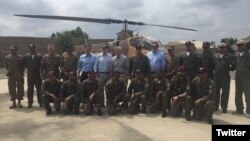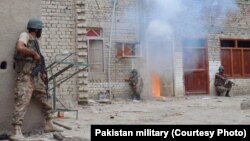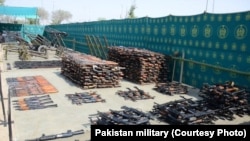A U.S. congressional delegation led by Republican Senator John McCain undertook a rare trip in a military helicopter to Pakistan’s restive North Waziristan tribal region Sunday, before concluding a two-day visit to the country and heading for neighboring Afghanistan.
The tribal territory, which borders Afghanistan, used to be a hub of local and international terrorists linked to groups, including al-Qaida, the Taliban and the Haqqani Network, and a staging ground for cross-border insurgent attacks. Until recently, the area was the scene of frequent U.S. drone strikes against suspected militant hideouts, killing scores of them.
But the Pakistan military says the Waziristan district has been mostly cleared of the insurgents since it undertook a massive ground and air offensive two years ago, destroying terrorist communication and bomb-making infrastructure there.
“I was very impressed with the progress (on the ground)," McCain, who is chairman of the Senate Armed Services Committee, told state-run television, PTV after visiting the Waziristan region.
Pakistani military commanders in Miranshah, the administrative center of the tribal district, briefed the U.S. lawmakers on the counterterrorism operations.
Other members in the delegation were South Carolina Republican Senator Lindsey Graham, Republican Senator Benjamin Sasse of New Jersey, and Indiana Democratic Senator Joe Donnelly. They held security-related talks with Pakistan’s military chief, General Raheel Sharif, on Saturday.
Improved relations a goal
McCain said he would like an improved relationship between Washington and Islamabad because they both face a common enemy in Islamic State and other extremist groups.
"I see us working together in confronting a common challenge – radical Islamic terrorism – and these kinds of meetings are very helpful to both those countries," the influential American senator added.
Pakistan and the United States have long had uneasy relations. Ties have been strained recently over allegations that Pakistan’s counterterrorism operations focus only on militants linked to the anti-state Pakistani Taliban, and that Islamabad is not doing enough to uproot sentries linked to Afghan militants, including the Haqqani Network terrorist group. Islamabad rejects the charges.
The alleged lack of progress on preventing Afghan insurgents from using Pakistani soil also recently prompted the U.S Congress to stop the Obama administration from subsidizing the purchase of eight F-16 fighter planes it had promised to Islamabad.
Relations have particularly deteriorated after a May 21 U.S. drone strike that killed the leader of the Afghan Taliban, Mullah Akthar Mansoor, in Pakistan.
Officials in Islamabad remain critical of the drone attack, insisting it derailed the efforts Pakistan was making to arrange peace talks between the Islamist insurgency and the Afghan government.
While speaking to PTV, Senator McCain said, “We look forward to closer relations and resolving the differences we have.”
A statement issued after Sunday’s meeting said Pakistani foreign policy advisor Sartaj Aziz briefed the U.S. delegation on efforts his country has been making to promote peace and stability in Afghanistan and to strengthen security along the long and porous Afghan border.












